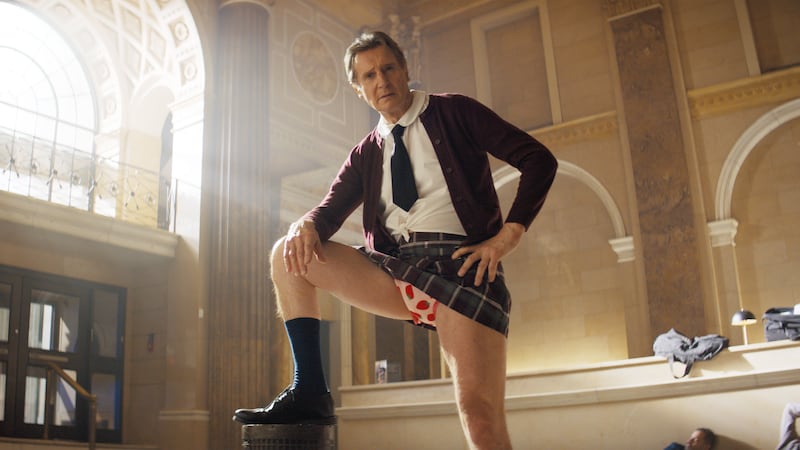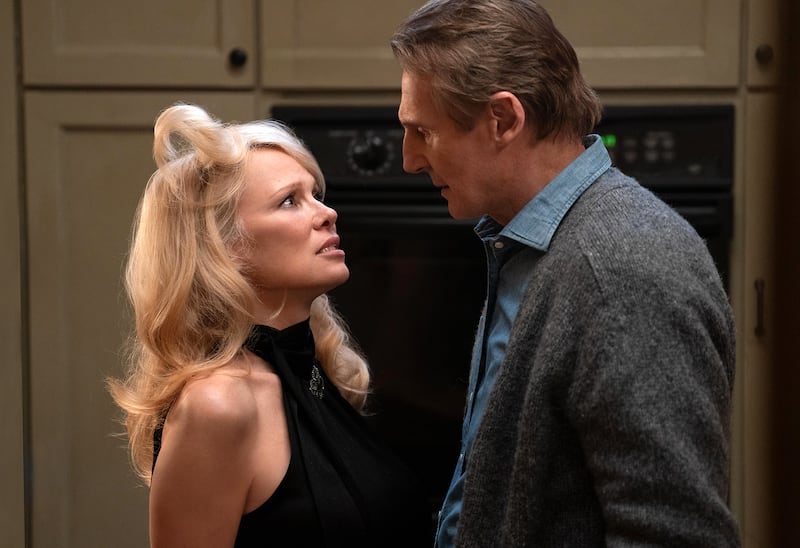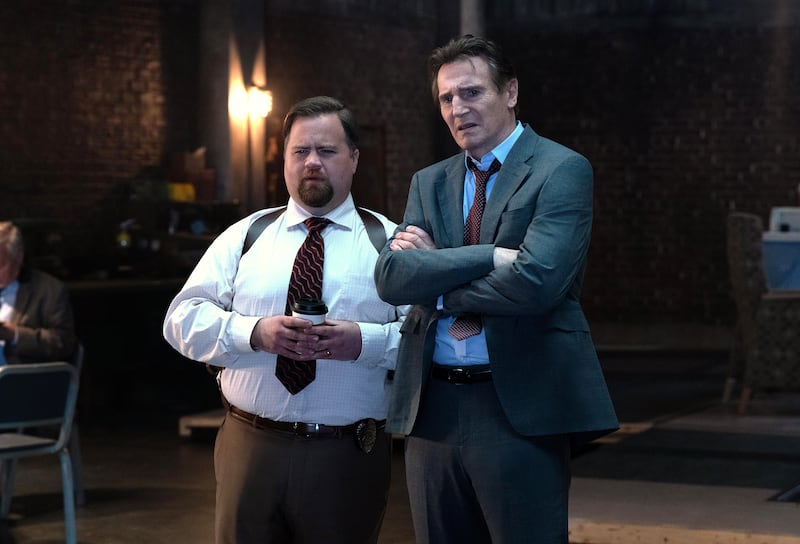To its legions of fans, rebooting The Naked Gun sounded sacrilegious, yet the only profane thing about Akiva Schaffer’s re-do is its hellishly funny humor.
Channeling the slapstick-y, pun-heavy spirit of Zucker, Abrahams, and Zucker’s classic trilogy (itself a spin-off of the early-1980s TV show Police Squad), this 21st-century take on the beloved series, hitting theaters August 1, is a big, brash, laugh-out-loud crime spoof led by a great Liam Neeson performance as Lt. Frank Drebin Jr., the son of the detective made famous by the incomparable Leslie Nielsen.
Whether it can save the big-screen comedy remains to be seen, but it’s just what the summer movie season needed.
Neeson’s Drebin is a chip off the old block, except with a decidedly more Taken attitude, as he demonstrates during an opening The Dark Knight-ish bank robbery which he infiltrates by disguising himself as a diminutive schoolgirl in a skirt, pigtails, and beret. Breaking the fourth wall at the beginning and end of his tale, Drebin announces himself as “the new version” after beating various bad guys to a pulp and crushing their guns in his hands and between his teeth.
Schaffer wastes no time diving headfirst into lunacy, and that’s where he keeps things for the rest of his film’s fleet 85 minutes, all of which are spent alternating between random bits related to the material’s nominal narrative, and total non sequiturs designed to elicit out-of-left-field chuckles.

Zucker, Abrahams, and Zucker’s predecessors were all hit-or-miss efforts whose aim grew wobblier with each sequel, and Schaffer’s The Naked Gun is no different, throwing so many jokes against the wall that some inevitably don’t stick. Nonetheless, its strong opening allows it to set a mirthful mood that rarely falters.
Despite Drebin busting many of the bank thieves, he doesn’t nab Sig Gustafson (Kevin Durand), who steals a computer drive dubbed “P.L.O.T. Device” and hands it over to Richard Cane (Danny Huston), the CEO of tech conglomerate Edentech, whose electric cars are all the rage.
Drebin encounters one of those vehicles the following day at a crash site alongside his partner Ed Hocken Jr. (Paul Walter Hauser), son of George Kennedy’s detective. They learn that the driver Simon Davenport perished in an apparent drive-off-a-cliff suicide—and then watch as a colleague attempts to move the car claw-machine style, complete with jaunty music.
Drebin isn’t on good terms with his boss Chief Davis (CCH Pounder), who chastises him for his rule-breaking ways, prompting him to ask incredulously, “Since when do cops have to follow the law?” Immediately thereafter, he’s visited in his office by Simon’s sister Beth (Pamela Anderson), a bombshell who takes his question “Care for a chair?” literally.

Beth suspects that her sibling was murdered, and Drebin’s snooping leads him to Cane, who asks him, “Do you suspect foul play?” and the straight-faced Drebin responds, “No, a chicken probably couldn’t do that.” Their tense conversation ends with Cane proclaiming that guests at his nightclub can, to quote the Black Eyed Peas, “get r----ded,” thereby instigating a hilarious back-and-forth about the turn-of-the-century hip-hop group.
What this nonsense has to do with anything is, well, nothing, and that’s to The Naked Gun’s benefit. With a script co-written with Dan Gregor and Doug Mand, Schaffer leans heavily into absurdity. Interrogating Busta Rhymes’ perp, Drebin checks the man’s file and is surprised to learn that he previously spent 20 years in prison for “man’s laughter—must have been quite the joke.” Wordplay of that sort is the proceedings’ bread and butter, and in tune with the Zucker-Abrahams-Zucker ventures.
So too is an extended sequence in which Gustafson spies on Drebin and Beth with heat-signature goggles and mistakenly assumes—due to the suggestive positions of their bodies—that they’re engaged in X-rated bestiality hijinks in the kitchen. Not everything lands, but on the whole, the film’s batting average is higher than 1994’s The Naked Gun 33 1/3: The Final Insult.
Neeson shrewdly doesn’t try to do Nielsen; as his Drebin tells a photo of his dearly departed pop, he yearns to be just like him and yet also different. Fortunately, the actor pulls off that trick, using his stern countenance and tough-guy persona for abjectly silly purposes, such as a scene in which he punches out adversaries in a line below a “Now Serving” counter.

The Oscar-winner’s superficial humorlessness is the key to his amusing turn, and while Anderson isn’t quite as deft a comedian, she’s up for loopiness, epitomized by her taking a supper-club stage and performing the worst scatting in musical history. Huston is similarly game as Drebin’s nemesis, and he receives perhaps the best quip of the entire film when he pours champagne for Beth and brags, “From Bill Cosby’s private estate!”
Schaffer piles on the noir-isms in The Naked Gun, which is overflowing with hardboiled cops, cackling crooks, melancholy horns, and shadows that peek through blinds and frame dames’ eyes. He additionally populates his frame with a variety of foreground and background gags, be it a mug shot station that looks like a professional photo shoot or a decommissioned Police Squad headquarters whose marquee has been replaced by a Spirit Halloween banner. Clever immaturity is the order of the day, and if its childishness isn’t always spot-on—Drebin’s habit of receiving cups of coffee from off-screen pals is ho-hum—it’s suitably and charmingly dumb.
The Naked Gun bombards its audience with inspired asininity, and there’s something refreshing about a film that knows how to deliver a surprising and witty one-liner, stage a proficient pratfall, and revel in inappropriateness—like Hocken doling out beer to minors and then, a short time later, upper-cutting them with untroubled viciousness. Smartly dim-witted, it never squanders its momentum by expending undue energy on its inconsequential narrative, and it goes over-the-top until the last frame.
Ultimately, the sole thing missing from its expertly daffy throwback action is an ex-pro football legend as Drebin and Hocken’s empty-headed third banana—although even in that regard, Schaffer manages to get in an A+ dig at the franchise’s most infamous star, wink-wink acknowledging that this reverential reboot is better off without that kind of juice.









